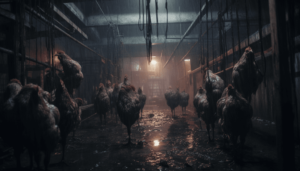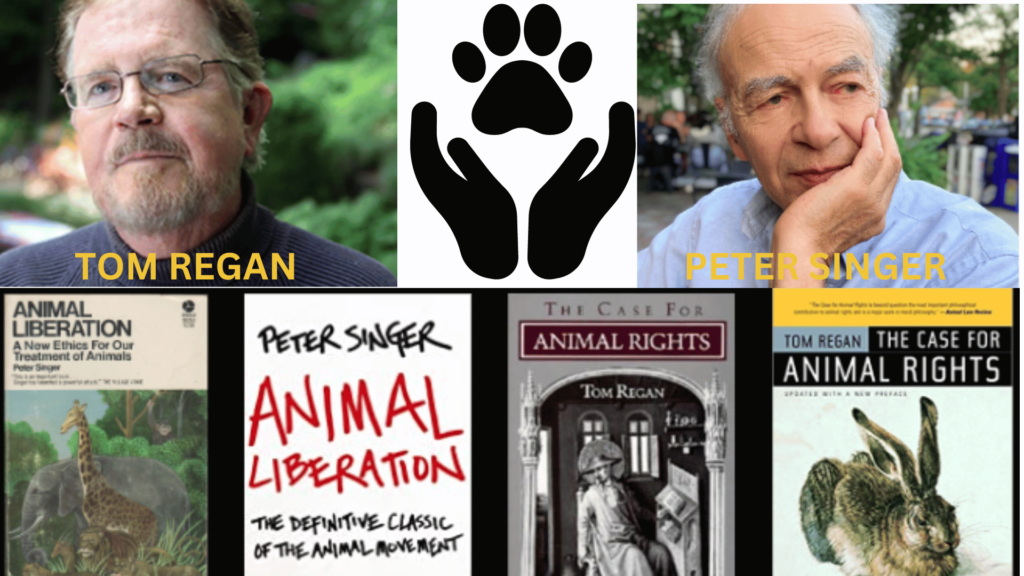Index of Contents
ToggleIntroduction: Recognising the Value of Animal Ethics and Rights
In today’s world, the significance of animal rights and ethics cannot be emphasised. All living things, including animals, have a moral obligation to be treated fairly and with dignity by humans. The foundation of animal rights is the idea that animals have inherent worth and shouldn’t be viewed as nothing more than sentient objects or commodities for human consumption.
Animal ethics is a more comprehensive approach that challenges the idea of speciesism, the idea that humans are superior to other species. It is not limited to the treatment of animals. Those who oppose speciesism contend that all living things, regardless of species, should be treated with the same respect and care.
At the heart of the animal rights movement is the goal of freeing animals from exploitation and suffering. This entails supporting moral behaviour in fields like farming and research, pushing for legislation protecting animals, and enticing people to lead kind lives that reduce the suffering of animals.
A more compassionate society requires an understanding of and commitment to animal ethics and rights. In addition to protecting animals’ wellbeing, it upholds our moral principles as compassionate people who acknowledge the intrinsic value of all living things. We can establish a society where non-human and human creatures may live in harmony and with dignity and respect if we stand out for animal rights.
The Pioneers: Peter Singer and Tom Regan’s Contributions to the Animal Rights Movement
A deeper comprehension and acknowledgment of animal rights have been made possible by the contributions of two well-known activists for animal rights, Peter Singer and Tom Regan. Singer and Regan have devoted their lives to fighting for the humane treatment of animals and changing the public perception of these creatures.
One of the main figures in the modern animal rights movement is the well-known author and philosopher Peter Singer. Published in 1975, his ground-breaking book “Animal Liberation” ignites a global conversation about our moral duties to non-human animals. According to Singer, animals’ ability for suffering justifies their treatment on par with that of humans.
Animal rights activist Tom Regan is another significant person in the movement. He created the theoretical framework known as “animal rights theory.” According to Regan’s 1983 landmark book “The Case for Animal Rights,” animals have inherent rights because of their inherent worth as unique beings. He promoted animals’ inherent value and cautioned against using them only to further human goals.
The public’s image of how we treat animals has been greatly impacted by these two pioneers. Their theories have prompted a great number of people to reevaluate how they interact with non-human animals and to challenge customs that damage or exploit them.
Peter Singer and Tom Regan have contributed significantly to the current state of the animal rights movement by their books and activities. As they work to create a more compassionate society where all sentient beings are treated with dignity and respect, their contributions continue to inspire new generations of animal rights activists.
A Revolution in Animal Ethics: Peter Singer’s “Animal Liberation” Book
“Animal Liberation,” a seminal work by Peter Singer, has completely changed the way we think about animal ethics. Singer makes a strong case for the moral concern of non-human animals with his thought-provoking philosophy on animal rights.
Utilitarianism is the moral paradigm that underpins Singer’s approach, emphasising the maximisation of general well-being and the minimization of pain. He questions conventional ethical viewpoints that deny animals moral value because of nothing more than their species. Singer contends that instead, the standard by which we should judge how to treat animals should be their sentience.
“Animal Liberation” illuminates the underlying brutality and exploitation that occur in the entertainment, factory farming, and animal testing industries. Singer reveals the moral contradictions in how we treat animals and advocates for a society that is more just and humane.
Numerous people have been motivated to reconsider their relationship with animals and have generated extensive conversations as a result of this significant book. Significant global advances in animal welfare legislation and activism have been made possible by it.
Peter Singer’s “Animal Liberation” continues to revolutionise the field of animal ethics by offering a reasoned and compelling argument for extending moral consideration to all sentient species. It urges us to work towards a more compassionate future for all living things and pushes us to reevaluate long-held assumptions about how we treat animals.
Expanding Our Circle of Compassion: The Concept of Anti-Speciesism
In a world where compassion is often limited to our species, the concept of anti-speciesism challenges us to expand our circle of compassion to include all sentient beings. Anti-speciesism is a philosophy that recognizes the inherent value and rights of every living being, regardless of their species.
At its core, anti-speciesism encourages us to question the arbitrary distinctions we make between humans and other animals. It prompts us to consider the suffering and interests of all sentient beings, not just those of our species. By recognizing animals’ shared capacity for pain, joy, and emotional experiences, we can dismantle the harmful hierarchy that places human interests above all others.
Expanding our circle of compassion requires a shift in mindset and behavior. It calls for adopting ethical practices prioritizing animal welfare in various aspects of our lives – from dietary choices to fashion preferences. It means acknowledging that all animals have their intrinsic worth and deserve to be treated with respect and kindness.
Embracing anti-speciesism does not mean disregarding human needs or diminishing their importance. Instead, it invites us to recognize that extending compassion beyond our own species benefits humans and non-human animals. By embracing this philosophy, we create a more inclusive society where every sentient being is valued and protected.
As we navigate an increasingly interconnected world, we must challenge existing biases and embrace a more compassionate worldview. Anti-speciesism allows us to redefine our relationship with other species and cultivate empathy towards all living beings. Let us embark on this journey together as we strive towards a more inclusive and compassionate future for all sentient beings.
Animal Farming and its Implications on Animal Rights and Welfare
Animal farming, particularly the practices associated with factory farming, has raised significant concerns about animal rights and welfare. The exponential growth of the animal farming industry has led to ethical implications that cannot be ignored.
Factory farming practices often prioritize profit and efficiency over animal well-being. Animals are usually confined to cramped spaces, deprived of natural behaviors and social interactions. They endure stressful conditions, including overcrowding, unsanitary environments, and painful procedures such as debeaking or tail docking.
The ethical implications of animal agriculture extend beyond physical suffering. Animals have inherent rights to live free from unnecessary harm and exploitation. We are violating their fundamental rights as sentient beings by subjecting them to these conditions.
Furthermore, the environmental impact of animal farming must be considered. The immense resources required for feed production, water consumption, and waste management contribute to deforestation, pollution, and climate change.
It is crucial for us to critically examine our relationship with animals in the context of food production. We must explore sustainable alternatives that prioritize animal welfare while addressing global food security challenges.
By promoting more humane farming practices, such as free-range systems or plant-based diets, we can work toward a future where animals are treated with respect and compassion while ensuring a sustainable food system for all.
Cruelty Behind Closed Doors: The Dark Realities of Factory Farming
Behind the closed doors of factory farms lies a dark reality that many consumers are unaware of – the unimaginable cruelty and inhumane treatment of animals within the agriculture industry. The practices employed in these facilities are far from ethical, and it is crucial to shed light on this issue to bring about change.
Factory farming has become a dominant method of food production, driven by the demand for cheap and abundant meat, dairy, and eggs. However, this system often prioritizes profit over animal welfare, resulting in deplorable animal conditions. From overcrowded and unsanitary living spaces to routine mutilations without anesthesia, the suffering endured by these sentient beings is genuinely heartbreaking.
The cruelty in factory farms extends beyond physical abuse. Animals are subjected to intense confinement that restricts their natural behaviors and instincts. They are denied access to fresh air, sunlight, or fundamental social interactions. This constant stress takes a toll on their mental well-being as well.
It is essential for us as consumers to be aware of these dark realities so that we can make informed choices about the food we consume. By supporting more compassionate alternatives such as organic farming or plant-based diets, we can contribute towards ending this cycle of cruelty.
Together, let us shine a light on the hidden horrors behind closed doors and advocate for a more humane and sustainable future in our agricultural practices.
The Effects of Animal Farming on Animal Welfare and Rights
Animal rights and welfare have become major issues as a result of animal husbandry, especially the methods connected to industrial farming. It is impossible to overlook the ethical ramifications of the animal farming industry’s tremendous expansion.
Animal welfare is frequently neglected in favour of efficiency and profit in factory farming methods. Animals kept in small settings are typically devoid of social interactions and their natural behaviours. They go through unpleasant treatments like tail docking and debeaking, as well as tense circumstances like crowded quarters and dirty surroundings.
Beyond just causing physical suffering, animal agriculture has ethical ramifications. Animals are entitled to a life free from needless suffering and exploitation. By putting them in these situations, we are transgressing their fundamental rights as sentient beings.
Additionally, one must take into account how animal production affects the environment. Deforestation, pollution, and climate change are caused by the massive amounts of resources needed for feed production, water use, and waste disposal.
In the framework of food production, we must critically evaluate our connection with animals. We need to investigate sustainable options that put animal welfare first while tackling the problems associated with global food security.
In order to ensure a sustainable food system for all, we may work towards a future where animals are treated with respect and compassion by encouraging more humane agricultural practices, such as free-range systems or plant-based diets.
Cruelty Beneath Closed Doors: The Sordid Truths of Industrial Farming
Many consumers are ignorant of the horrible truth that exists behind the closed doors of factory farms: the horrifying cruelty and terrible treatment of animals in the agriculture sector. These facilities’ activities are unethical, and in order to effect change, it is imperative that this matter be made public.
The need for inexpensive and plentiful meat, dairy, and eggs has led to the dominance of factory farming as a means of producing food. Unfortunately, this system frequently puts profit ahead of the welfare of animals, which leads to appalling conditions for the animals. The pain these sentient creatures experience is truly distressing, ranging from frequent mutilations without anaesthesia to cramped, filthy living quarters.
Beyond simple physical torture, factory farms also practise cruelty. Animals are kept in severe confinement, which limits their innate instincts and behaviours. They are deprived of sunlight, clean air, and essential social contacts. Their mental health suffers as a result of this ongoing stress.
In order to make wise decisions about the food we eat, it is imperative that we, as consumers, are aware of these grim truths. We may help break the cycle of suffering by endorsing more humane options like plant-based diets and organic farming.
Together, let’s raise awareness of the unseen tragedies that occur behind closed doors and push for future agriculture techniques that are more sustainable and humane.



